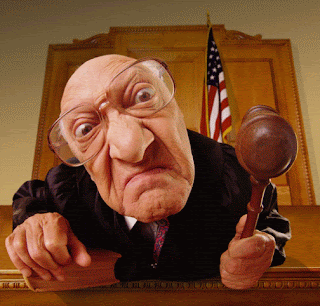Weekly Opinion Editorial
JUDICIAL RACES
SHOULD BE PARTISAN!
by Steve Fair
State
Representative Kevin Calvey, (R-Edmond) will file a bill- House Joint
Resolution #1037- to place on the November 2016 ballot the opportunity for
Oklahomans to vote on whether the State Supreme Court and two appellate court
judges would be elected in nonpartisan elections. The bill would have to clear the State House
and Senate before it gets to the ballot.
“Our current system of selecting state Supreme Court jurists is not transparent, not accountable to the people and is dominated by the lawyers’ special interest group. No wonder we get outrageous state Supreme Court decisions like banning the Ten Commandments, causing extra costs on doctors and small business owners and allowing predatory abortionists like felon Dr. Patel to remain unregulated. Twenty-one states elect their state Supreme Court by popular election. States which elect their Supreme Courts actually rank better than Oklahoma in terms of impartiality and the competence of judges. Contrary to the special-interest hysteria of entrenched opponents of reform, the facts show that electing state Supreme Court jurists will improve Oklahoma’s judiciary, not cause problems. It is also contrary to false claims from the lawyers’ special interest group, the Oklahoma Bar Association, that Oklahoma’s current system was not necessary to prevent judicial corruption in a 1960s court bribery scandal. The truth is, the lawyers used the judicial bribery scandal as a pretext to enact Oklahoma's lawyer-dominated judicial selection system, a system that had been proposed over 25 years earlier,” Calvey said.
Calvey
is right on the history of how Oklahoma went from directly electing the judicial
to a retention ballot system that simply doesn’t work. The law lobby effectively convinced the
public they knew who would be better on the bench than the electorate. Currently seventeen states, including
Oklahoma hold ‘retention’ elections for judges.
Retention doesn’t work here and it doesn’t work across the country. In the sixty years since Kansas has had
retention, it hasn’t voted out a judge. There
is a major movement in Illinois to jettison the retention ballot system. There the judge has to get 60% to stay on the
bench, and they have never kicked one off the bench.
A
recent poll conducted by North Star Opinion found that 79% of registered voters
polled favor directly electing the judiciary with only 16% favoring the current
retention system. A.J. Ferate, the State
GOP General Counsel, says the poll shows that an overwhelming majority of
Oklahomans want to see real elections for judges. “When implemented, HJR 1037 will bring transparency to judicial
selection and balance of powers between the branches of government,” said Ferate. “The
poll numbers show that independent of political party, Oklahomans want change
in the way state Supreme Court jurists are selected.”
Currently
seven states, including Texas Alabama, and Louisiana, have ‘partisan’ races for
their high courts. Fourteen states hold
non-partisan elections for justices.
Calvey’s
proposal would mirror how district and associate district judges are currently elected
in the Sooner state. They are elected in
what is billed as non-partisan elections and can’t associate with any political
Party or tell people how they are registered.
The non-disclosure of Party affiliation is a stupid rule and quite
frankly makes no sense. Fact is- no election
is completely non-partisan. Partisan is
defined as someone who is a strong supporter of a party, cause or person. Every person has values, opinions, and
convictions. One of the best ways to
discern what those values, opinions and convictions is to know which political
Party they are affiliated with. If they
are pro-life, pro-second amendment, pro-limited government, they are likely
registered Republican. If they are
pro-choice, pro-gun control, and believe the government should run every facet
of our life, then they are likely a Democrat.
Party affiliation is our first vote.
It is important. A person should
be proud of the political Party affiliation, just like their religious
affiliation. Every candidate, at all
levels and for all races should all have to declare what their Party
affiliation is. It helps voters identify
what their view of the role of government truly is.
Calvey’s
idea is a far sight better than what we have, but encourage your state
legislator to support a proposal to make judges run partisan races, like in Texas,
Alabama, and Louisiana. That would force
judicial candidates to help us know if they are a conservative or liberal. We have enough liberal jurists now.




No comments:
Post a Comment